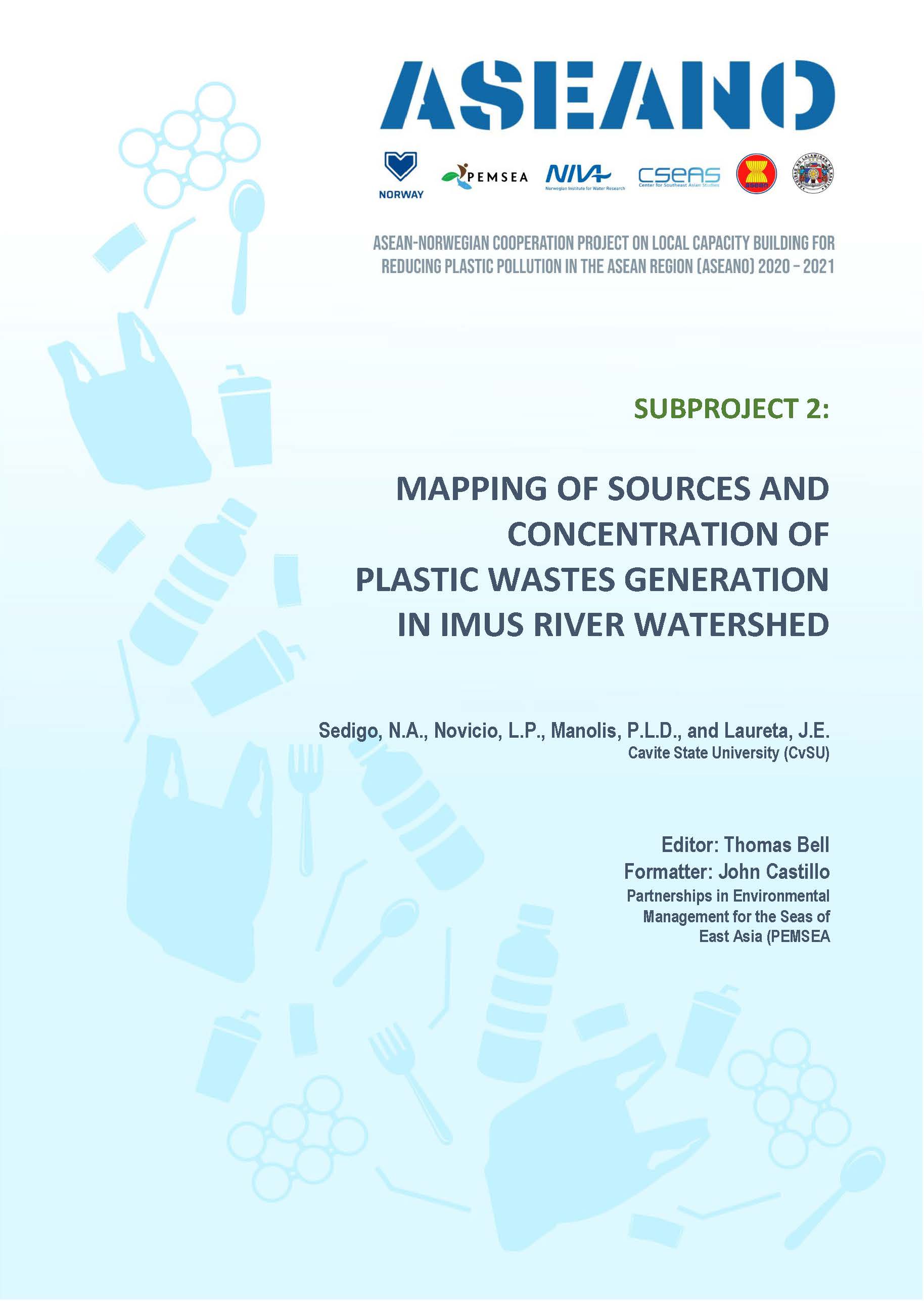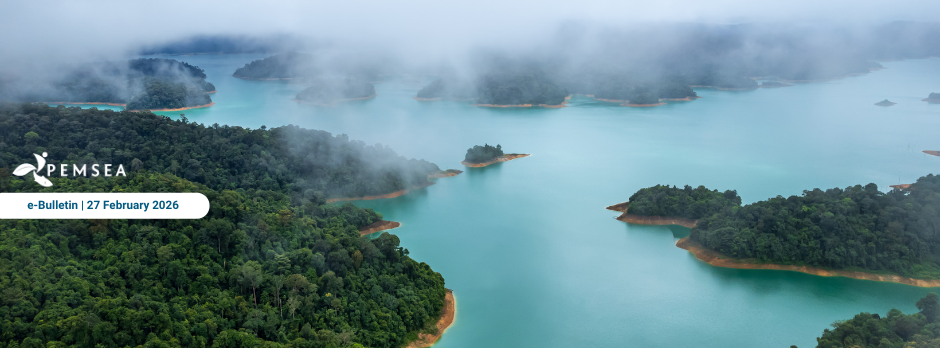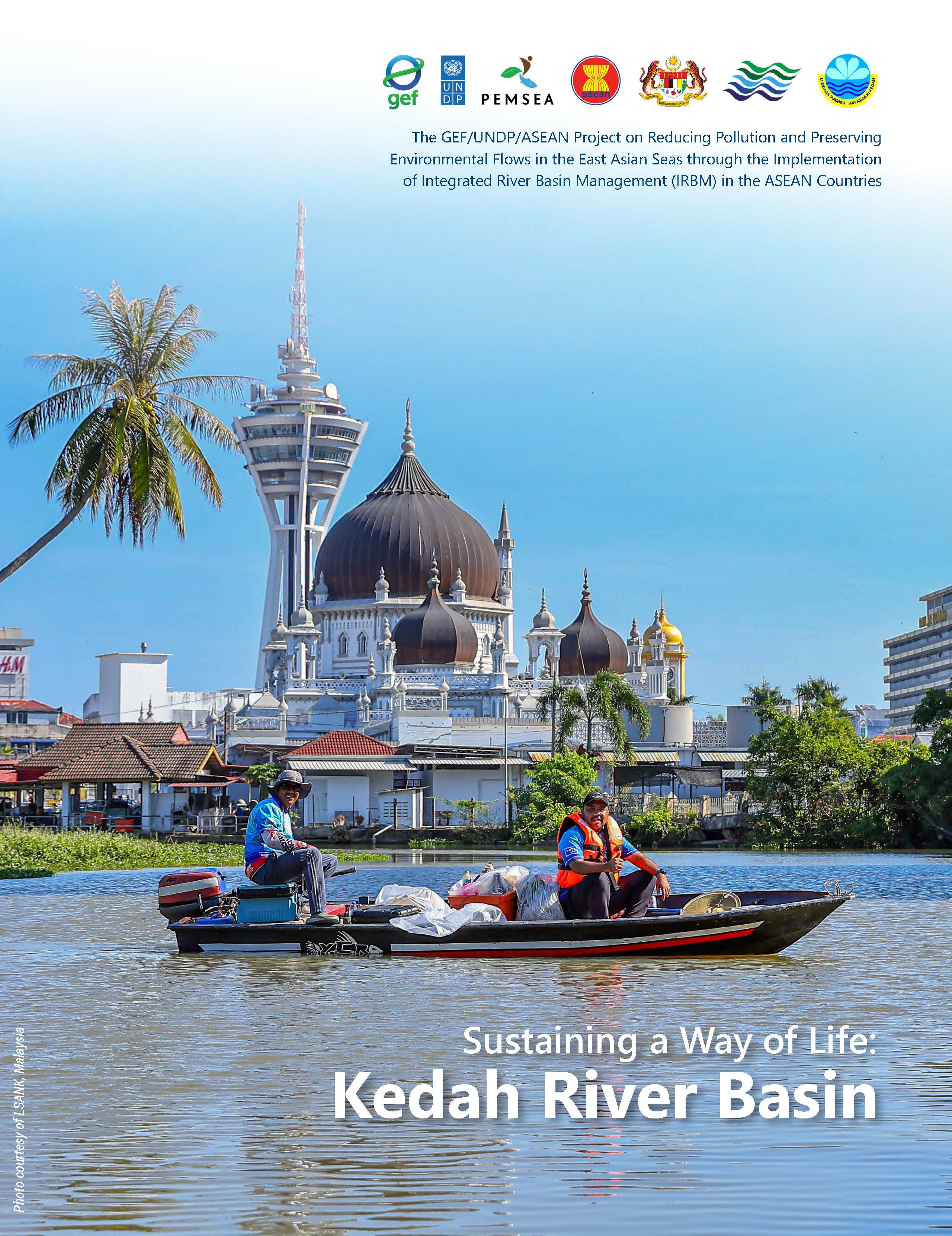
Breadcrumb
ASEANO Project Report: Mapping of Sources and Concentration of Plastic Waste in the Imus River Watershed
PUBLICATION DATE:
Tuesday, April 19, 2022
PUBLICATION TYPE:
Reports
STATUS:
Only Available Online
DESCRIPTION:
The sources of plastic wastes and areas of expected high levels of plastic waste generation were mapped in the Imus River Watershed in the Province of Cavite, in the Philippines. Different sources of plastic waste were identified, and used to estimate the magnitude of plastic waste generation. Information on the major sources of plastic waste were obtained from the 10-Year Solid Waste Management Plan of the seven cities and municipalities located within the boundaries of the watershed. Remote sensing technology was used to identify the coordinates of different potential sources. For higher resolution, Google Imagery was used in preparing base maps which were imported and georeferenced in ArcMap. A 7-day waste characterization study in three selected barangays was conducted to determine the average amount of plastic waste generated per household. This data served as inputs for a hotspot analysis in ArcGIS to identify plastic waste generation hotspots within the watershed. The Imus River system traverses seven cities and municipalities that include parts of Tagaytay City, Silang, and Amadeo in the upland areas, a large part of the densely populated and urbanized cities of Dasmariñas and Imus City in the central hilly areas, and portions of the lowland City of Bacoor and the coastal Municipality of Kawit. It has a total drainage area of 11,259.80 hectares. A total of 222 barangay communities were identified within the boundaries of the watershed with a total population of 1,351,057. The major sources of waste in the watershed were primarily households, followed by commercial, institutional, and industrial establishments. The total number of commercial, institutional, and industrial establishments identified was 778, and a total of 54 waste storage facilities were found in the watershed. From the 7-day characterization study in three selected barangay communities, an average of 113.03 kg of plastics was generated daily by the households in Barangay Burol 1, Dasmariñas City; 9.17 kg/day in Barangay Mabolo 1, Bacoor City; and 29.29 kg/day in Barangay Maitim 2nd Central, Tagaytay City. An average of 0.17 Kg/day per household of plastics were generated in the watershed and 0.05 Kg/day per capita. A cluster of high plastic waste generating barangays was identified in Dasmariñas City, where various tributaries of the Imus River converge. This combination is likely to create a significant hotspot for waste leakage. Clusters of low plastic waste generating barangays were identified in parts of Imus, Kawit, and Bacoor. These cold spots should not be ignored, as increasing plastic waste generation could exceed capacity and push them into future leakage hotspots.
RELATED PUBLICATIONS
-
PEMSEA eBulletin - February 2026
Dear PEMSEA community,
Short month. Big moves. February saw PEMSEA turn vision into action, advancing major initiatives across the East Asian Seas.
In the Philippines, the Department of Environment and Natural Resources–Biodiversity Management Bureau, together with Conservation International and support from the Global Environment Facility, officially launched the PRICELESS Project. The five-year initiative aims to strengthen the conservation and sustainable management of the Philippine Rise Marine Resource Reserve through science-based governance, enhanced marine protection, and inclusive partnerships supporting long-term ecosystem resilience.
In Timor-Leste, implementation of the MOF/PEMSEA Marine Plastics ODA Project formally commenced through a national launching meeting led by the Ministry of Agriculture, Livestock, Fisheries and Forestry in partnership with the Ministry of Tourism and Environment and PEMSEA.
In Pampanga, Philippines, the GEF/UNDP/ASEAN Integrated River Basin Management (IRBM) Project convened partners to address watershed challenges and identify targetted strategies for the Pasac–Guagua Watershed.
This month, we also feature the the story of Kedah River Basin in Malaysia, where fishing guides, rice farmers, women food entrepreneurs, and government partners work together to sustain Sungai Kedah from forested headwaters to the rice plains below.
-
IRBM Stories - Sustaining a Way of Life: Kedah River Basin
In Kedah, Malaysia, fishing guides, rice farmers, women food entrepreneurs, river associations, and government partners are working together to sustain Sungai Kedah — the Kedah River — from its forested headwaters in Ulu Muda to the rice plains below. Along its course, communities depend on regulated flows for paddy cultivation, inland fisheries, river-based enterprise, and food traditions that have long shaped Kedah’s identity as the nation’s rice bowl.
Monsoon floods, sedimentation, and pollution place increasing pressure on the basin. Along the river, local groups practice catch-and-release fishing, organize clean-ups, and build enterprises rooted in its waters. At the same time, coordination among state and national agencies — through a Source-to-Sea approach that advances integrated river basin management and governance — is deepening shared responsibility across the basin.
Read more about the Kedah River Basin profile.
-
MOF/PEMSEA Marine Plastics ODA Project Interim Regional Steering Committee Meeting
The Regional Steering Committee (RSC) meeting is the highest decision making body of the Official Development Assistance (ODA) Project entitled “Reducing Marine Plastics in the East Asian Seas Region” comprised of the donor: the Government of Republic of Korea represented by the Ministry of Oceans and Fisheries (MOF), and the participating countries: the Philippines, represented by the Department of Natural Resources and Environment (DENR) and Timor-Leste, represented by the Ministry of Agriculture, Livestock, Fisheries and Forestry (MALFF) and the Ministry of Tourism and Environment (MTE). The Regional Project Management Unit (RPMU) of the PEMSEA Resource Facility (PRF) of Partnerships in Environmental Management for the Seas of East Asia (PEMSEA) serves as the Secretariat.
The RSC convenes every year to report the progress and approve work plan and budget for the following year’s project activities. The chairmanship is assumed by both participating countries on an alternating basis. This inaugural RSC meeting was organized in Manila, Philippines and chaired by the Government of the Philippines, represented by H.E. Undersecretary Jonas Leones of the DENR.
The Interim RSC Meeting was held on 12 December 2023 via Zoom.
-
MOF/PEMSEA Marine Plastics ODA Project Second Regional Steering Committee Meeting
The Regional Steering Committee (RSC) meeting is the main decision making body of the Official Development Assistance (ODA) Project entitled “Reducing Marine Plastics in the East Asian Seas Region” comprised of the donor: the Government of Republic of Korea represented by the Ministry of Oceans and Fisheries (MOF), and the participating countries: the Philippines, represented by the Department of Natural Resources and Environment (DENR) and Timor-Leste, represented by the Ministry of Agriculture, Livestock, Fisheries and Forestry (MALFF) in collaboration with the Ministry of Tourism and Environment (MTE) and Ministry of State Administration (MSA). The Regional Project Management Unit (RPMU) of the PEMSEA Resource Facility (PRF) of Partnerships in Environmental Management for the Seas of East Asia (PEMSEA) serves as the Secretariat to the RSC.
The RSC meets at least once a year to report on the progress of the project, sets its strategic directions and guidance and approves work plan and budget for the following year’s project activities. The inaugural RSC meeting in 2023 was chaired by the Government of the Philippines, represented by H.E. Undersecretary Jonas Leones of the DENR. This year, the 2nd RSC meeting was chaired by the Government of Timor-Leste, as represented by the Advisor to the Secretary of State for Fisheries, MALFF, Mr. Aleixo Leonito Amaral.
The 2nd RSC Meeting was held on 17 December 2024 via hybrid format at Radisson Park Inn, Quezon City and Zoom.
-
MOF/PEMSEA Marine Plastics ODA Project Intersessional Regional Steering Committee Meeting
The Intersessional Regional Steering Committee (RSC) Meeting of the MOF/PEMSEA ODA Project on Reducing Marine Plastics in the East Asian Seas Region was held on 17 September 2025 via Zoom, in line with the agreements made during the 2nd RSC Meeting in December 2024. The primary objective of this session was to review and endorse the detailed designs of pilot projects in the six Philippine project sites: Bulan, Calbayog, Daanbantayan, Dipolog, Puerto Princesa, and Tandag.
These pilot projects form part of Component 2 of the ODA Project, which focuses on demonstrating best practices and locally adapted solutions for marine plastics reduction. Designed to respond directly to site-specific challenges identified during the baseline assessments, the pilot projects aim to improve local plastics and waste management systems, enhance community engagement, and reduce the leakage of plastic waste into coastal and marine environments. The interventions are aligned with national and local priorities.
During the 2nd RSC meeting in 2024, the pilot project concepts for the Philippine sites were approved. Subsequently, the detailed designs of the pilot projects have been developed by the consulting firm, EECI, Inc., in close collaboration with local government units (LGUs) in 2025. These designs reflect the insights, technical inputs, feasibility, and on-ground realities gathered through extensive stakeholder consultations.
The Intersessional RSC meeting was an essential step to ensure that the proposed interventions are sound, feasible, and ready for implementation. The outcomes will not only guide the pilot project implementation but also reinforce the collective commitment of project partners to achieve measurable impacts in reducing marine plastics in the Philippines.
The meeting was organized in hybrid format: at the conference room of the office of Undersecretary Jonas R. Leones and through Zoom for the online participants.





